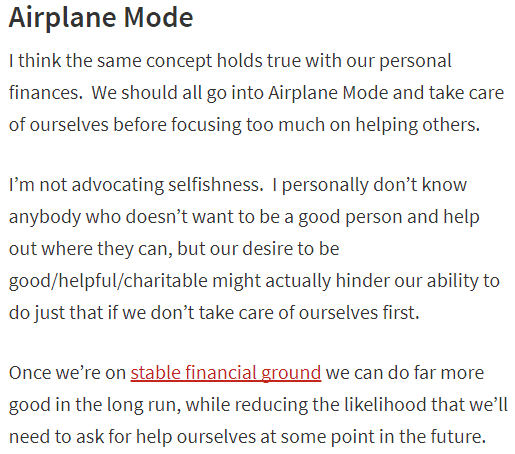
4 min read
THIS POST MAY CONTAIN AFFILIATE LINKS. PLEASE READ MY DISCLOSURE FOR MORE INFO.
I have read some great books on philosophy, psychology, work ethic, and finance over the years, but one book in particular has influenced me the most. It’s one that I revisit often to keep it’s ideas fresh in my head. It is How I Found Freedom in an Unfree World by Harry Browne.
The book is about how to find the freedom to live how you want in a world where it may feel like the government, institutions, peers, coworkers, or family members are preventing you from doing so.
This book is packed with wonderful ideas. Here are a few of my favorites.
“To be nobody but yourself — in a world which is doing its best, night and day, to make you somebody else — means to fight the hardest battle which any human being can fight; and never stop fighting.” — E.E. Cummings
To be true to yourself and pursue a path in life that makes you happy is one of the most difficult tasks we can undertake as humans. Whether it’s our friends, teachers, parents, siblings, coworkers, or bosses, virtually everyone we know freely gives us their thoughts on what they think we should do in life.
Parents and siblings have a tendency to give us life advice. Friends have a tendency to dish out relationship advice. Teachers, coworkers and bosses tend to give us career advice. All of these people have good intentions – they want what’s “best” for us – but unfortunately with all this input, it can be hard to hear the voice inside ourselves telling us what path we actually want to pursue.
This makes it difficult to go against the grain. To choose a working life that aligns with our interests, relationships that suit our needs, and lifestyles that bring us joy, is one of the hardest things to do.
When we choose to do something that doesn’t align with the advice given to us, we’re often told we’re being “selfish”. Browne offers a great rebuttal to this:
“And when someone accuses you of being selfish, just remember that he’s upset only because you aren’t doing what he selfishly wants you to do.”
This piece of advice is particularly relevant in the personal finance space. In a world filled with low savings rates and rampant lifestyle inflation, it can be seen as selfish to actually save money and live frugally. The world tends to view savers as “greedy”, “money hoarders”, and “tightwads”.
Browne offers a different perspective. The people who label you as selfish are only doing so because you aren’t doing what they selfishly want you to do.
Ty from Get Rich Quickish recently wrote a nice piece on this concept, referring to taking care of yourself first as “Airplane Mode”, in reference to placing your oxygen mask on yourself first before helping others during airline emergencies:

By living frugally and saving money, you can build a stable financial ground that gives you flexibility in life. With this flexibility comes freedom – freedom to help others, do work you actually enjoy, and contribute something meaningful to the world. Living frugally isn’t selfish if it frees up time for you to actually use your unique strengths to make the world a better place.
Browne goes on to share another fascinating idea:
“To be self-reliant is to recognize that no one else is as concerned about your future as you are and that no one knows as much about you as you do.”
Despite what everyone around you thinks you should do, you are the only person who ultimately has to live with your decisions. If you choose to live in a way that isn’t true to yourself just to make others happy, you are the one who will suffer.
Browne continues,
“You are you, the person who will live with the consequences of what you do. No one else can be responsible, because no one else will experience the consequences of your actions as you will.”
When other people try to pressure us into a certain way of living, they don’t have to face the consequences of our decision. They simply carry on with their own lives. This is important to remember.
There are so many more influential ideas in this book that changed my way of thinking about life, but these are some of my favorites.
The overarching theme in this book is that to truly live a free life requires that we follow our own path and pursue a lifestyle that brings us joy, whether or not that aligns with the expectations of our peers.
Admittedly, this is hard to do. Many of us crave to please our parents, teachers, and bosses, but often this comes at the expense of our own happiness.
It’s important to remember that this is our only shot at life. You are the only person who has to live with your decisions.
To obtain freedom, take care of yourself and your finances first. By doing so, you’ll have the means to help others, pursue work you actually enjoy, and live in a way that brings you meaning and joy.
- The Ad Revenue Grid - August 6, 2021
- Attract Money by Creating Value for a Specific Audience - July 13, 2021
- The 5-Hour Workday - March 26, 2021
Full Disclosure: Nothing on this site should ever be considered to be advice, research or an invitation to buy or sell any securities, please see my Terms & Conditions page for a full disclaimer.

I too love How I Found Freedom It’s been hugely influential in my own life. It’s not a perfect book — I find that Browne’s political position (strong libertarian) doesn’t follow as naturally from his personal position as he thinks. That might seem surprising — doesn’t a quest for personal freedom naturally lead to libertarianism? — but it’s true. In fact, I think that libertarianism in some ways is the OPPOSITE of what Browne espouses with regards to personal freedom. It’s giving up control to the state by becoming overly focused on it.
In my head, I have a book I want to write. I’ve already written two-thirds of it. One-third is the material collected in my “Money Boss Manual”, all the nuts and bolts of how to achieve financial independence. The second third is about happiness, and I’ve written about twenty thousand words on that. (That material can be found scattered at my various websites.) But the final third is about personal freedom and how it relates to both happiness and financial independence. For whatever reason, I’ve been unable to produce anything substantial on this subject even though I’ve been trying for more than five years. I have notes on the source material (Browne’s book, “How People Change” by Allen Wheelis, etc.) but can’t seem to distill it into a unified whole.
But it’s been several years since I read How I Found Freedom. Perhaps I should do so again.
I’d love to read that book if you ever finish it in the future. I’m also deeply fascinated with the connection between money, happiness, and freedom. The more I read about the psychology of happiness, the more I come across the same factors that lead to happiness – connection, freedom, and meaningful work.
Financial independence can bring freedom. It can also give you flexibility to do meaningful work. The tricky part is finding work you actually enjoy doing once you’re F.I. The other component, “connection” makes sense to me as well. A social circle provides stability, support, and meaning. One of my favorite books on the importance of having a social group is “The Village Effect” by Susan Pinker, where it’s explained that the number one cause of longevity is a tight-knit social group. It makes me think of Buffett and Munger – both are in their late 80’s/early 90’s and yet show up to work every day and do something they love because they found work they enjoy and a group of people they like working with.
I’ve never heard of “How People Change” – I’ll check that out!
I am definitely going to be picking this book up!
There is no greater day in the world when you finally discover “yourself” and your true passion/calling. I have definitely worked jobs in my life simply because they paid the bills, even though I knew deep down it wasn’t my passion. I feel most fall into this zone. Not only is it not easy to initially take that first leap and go against the grain, but also most of us truly don’t know what we want to do with our lives. The majority are content with floating by as long as their bills are paid, and they have the ability to still do some of the things they enjoy.
You (and the book) highlight that it can be difficult to make that initial leap because you can get some pushback from your friends, co-workers, and peers. You also nail it in that this is because you are doing something they didn’t advise you to do, or they are simply jelous you are doing something they wish they did at some point in their lives.
I have been out of college for 3 years and worked 2 different jobs within the federal government. It has been “okay” work and some what satisfying, but I always knew personal finance was my true passion. After I created my personal finance blog 2 weeks ago, I have never felt more ALIVE in my life. These past 2 weeks working on my passion has been the most thrilling work experience of my life!
Thanks for the share!
That’s awesome to hear you have had such a great blogging experience so far! It’s definitely enjoyable to write about a topic you’re passionate about. Looking forward to seeing what you write in the future and best of luck 🙂